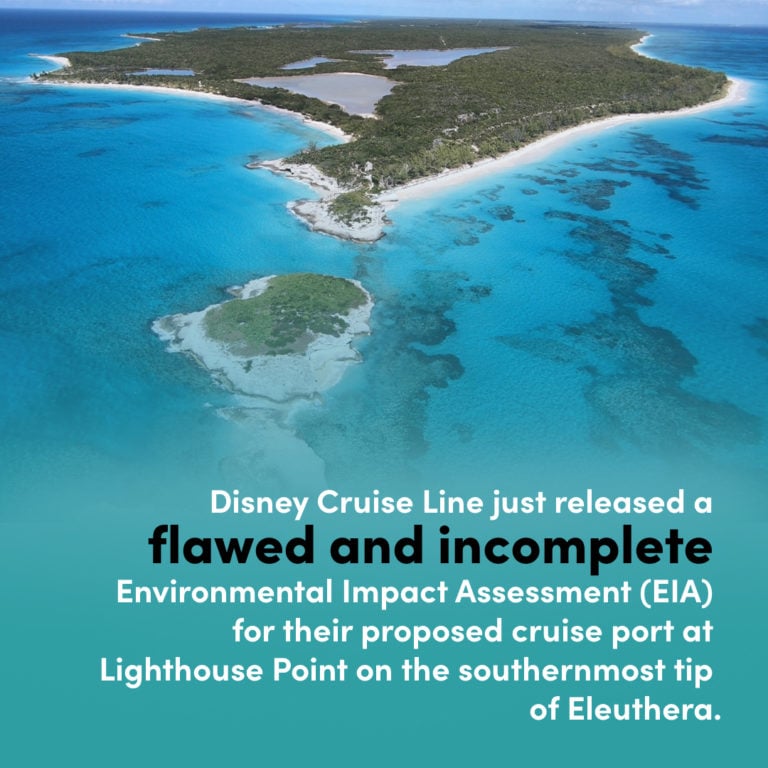Deadline Looming for Public Comments on Disney’s Controversial Cruise Port in The Bahamas
By: Waterkeeper Alliance

The Stop Disney – Last Chance for Lighthouse Point Campaign is urging the public in The Bahamas and across the world to submit comments on Disney’s Environmental Impact Assessment (EIA) for their proposed cruise port at Lighthouse Point on the southernmost tip of Eleuthera in The Bahamas.
Public comments are due on May 7, 2021, and must be submitted directly to [email protected] or via Disney’s project website.
More than 444,000 people already support the Campaign’s petition urging Disney to reconsider its plans for a $400 million cruise port at Lighthouse Point on the island of Eleuthera. The development is set to be located right at the heart of a proposed Marine Protected Area — an important passageway for bonefish and other marine species. The port would include a half-mile-long pier built on top of important marine habitats and would bring up to 20,000 visitors every week to this pristine site.
On March 10, Disney released their flawed EIA for the project. On April 8, The Bahamian Government held a truncated public consultation that attracted more than 350 people. The session left many unanswered questions about the adequacy of the environmental review.
As a result, the Last Chance Campaign hosted extended public consultations on April 15 and April 22, to further open public discussion about the EIA. Numerous independent experts have come to the same conclusion: the EIA is filled with gaps. A number of independent experts spoke about the fundamental flaws in the document, particularly in regard to economics, coral reefs, fisheries, climate change, and sea level rise. Dr. Gregory Miller, Executive Director of the Center for Responsible Travel, and Dinah Bear, former General Counsel at The U.S. President’s Council on Environmental Quality (CEQ), both concluded that the EIA would not meet the standards that Disney would be required to follow in the U.S., its own country. Most notably, they pointed out that the EIA does not consider an alternative to the cruise port, as is standard practice for EIAs around the world.
Such an alternative concept has been put forward recently by Chris Maxey, the founder of the Island School in southern Eleuthera. Mr. Maxey recently wrote to Disney’s CEO, Bob Chapek, asking him to consider cooperating with local organizations on a lower-impact, sustainable alternative that would better protect the environment and provide more jobs for Bahamians. Mr. Maxey did not receive a response.
James Lima, an international expert on sustainable development who has worked closely with local groups on Eleuthera, said at the April 15 meeting, “We found that a plan centered around educational and ecotourism, stay-over-tourism, at a very small footprint of the site would generate 27 times greater economic benefit for The Bahamas than the proposed Disney plan.”
Dr. Thomas Goreau, President of the Global Coral Reef Alliance and Chief Scientist at Blue Regeneration, pointed out that the EIA is completely inadequate when it comes to its assessment of impacts to coral reefs. He added that the reefs at Lighthouse Point “are some of the best reefs left in The Bahamas…that’s why the area was designated to be a Marine Protected Area…it is one of The Bahamas’ top marine conservation priorities without any question.”
The Woods Hole Group, an environmental engineering and consulting organization, conducted a review of Disney’s EIA and concluded that the document does not adequately address climate change implications related to the project.
Jacob Scherr, former Director of Global Advocacy at the Natural Resources Defense Council, and senior advisor to the Last Chance Campaign, added: “If Disney is to be truly environmentally responsible, it cannot continue to downplay or ignore the realities of a changing climate and rising seas…Disney still has an opportunity to do something truly transformational at Lighthouse Point and to provide the leadership our planet needs to assure a brighter, more sustainable future, not only for Eleutherans and Bahamians, but for all of us.”
Big conglomerates like Disney have a corporate and social responsibility to operate in a manner that is sustainable for people and the planet. Sam Duncombe, reEarth, added: “It is absolutely crucial to submit comments on this EIA and let both Disney and the Government know that it is not good enough. Disney needs to withdraw their current draft EIA, conduct supplemental studies, and resubmit an updated EIA that includes all of the information necessary to determine the best option for the environment and people of The Bahamas.”
More information can be found at stopdisney.com.